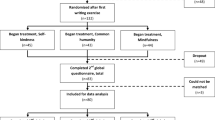Abstract
Two hundred and seventy five participants each filled out three questionnaires examining the illusion of control, optimism/pessimism, and paranormal belief. The illusion of control was related to overall paranormal belief, an effect primarily due to the superstition and precognition sub-scales on the PBS-R. Optimism was positively and pessimism negatively related to religiosity on the PBS-R, and pessimism was also positively related to the superstition sub-scale. No relationships between optimism or pessimism and the illusion of control were observed. Results are discussed in terms of superstition and the illusion of control both arising from circumstances that are inherently random or uncontrollable, and how multiple definitions of optimism or superstition could have effected the results.
Similar content being viewed by others
References
Abramson, L., Seligman, M., & Teasdale, J. (1978). Learned helplessness in humans. Journal of Abnormal Psychology, 87, 49–74.
Ackermann, R., & DeRubeis, R. J. (1991). Is depressive realism real? Clinical Psychology Review, 11, 565–584.
Alloy, L. B., & Abramson, L. Y. (1979). Judgment of contingency in depressed and nondepressed students: Sadder but wiser? Journal of Experimental Psychology: General, 108, 441–485.
American Psychological Association. (1992). Ethical principles of psychologists and code of conduct. American Psychologist, 47, 1597–1611.
Buchwald, A. M., Coyne, J. C., & Cole, C. S. (1978). A critical evaluation of the learned helplessness model of depression. Journal of Abnormal Psychology, 87, 180–193.
Dember, W. N. (1974). Motivation and the cognitive revolution. American Psychologist, 29, 161–168.
Dember, W. N., Martin, S. H., Hummer, M. K., Howe, S. R., & Melton, R. S. (1989). The measurement of optimism and pessimism. Current Psychology: Research and Reviews, 8, 109–119.
Dember, W.N., & Brooks, J. (1989). A new instrument for measuring optimism and pessimism: Test-retest reliability and relations with happiness and religious commitment. Bulletin of the Psychonomic Society, 27, 365–366.
Frankel, A., & Snyder, M. L (1978). Poor performance following unsolvable problems: Learned helpless-ness or egotism? Journal of Personality and Social Psychology, 36, 1415–1423.
Gollwitzer, P. M., & Kinney, R. F. (1989). Effects of deliberative and implemental mind-sets on illusion of control. Journal of Personality and Social Psychology, 56, 531–543.
Harris, P. (1996). Sufficient grounds for optimism? The relationship between perceived controllability and optimistic bias. Journal of Social and Clinical Psychology, 15, 9–52.
Hiroto, D. (1974). Locus of control and learned helplessness. Journal of Experimental Psychology, 702, 187–193.
Hiroto, D. S., & Seligman, M. E. P. (1975). Generality of learned helplessness in man. Journal of Personality and Social Psychology, 31, 311–327.
Hoorens, V. (1994). Unrealistic optimism in social comparison of health and safety risks. In D. Rutter (Ed.), The Social Psychology of Health and Safety (153–174). Aldershot: Avebury.
Hummer, M. K., Dember, W.N., Melton, R.S., & Schefft (1992). On the partial independence of optimism and pessimism. Current Psychology, 11, 37–50.
Langer, E. (1975). The illusion of control. Journal of Personality and Social Psychology, 32, 311–328.
Matute, H. (1994). Learned helplessness and superstitious behavior as opposite effects of uncontrollable reinforcement in humans. Learning and Motivation, 25, 216–232.
Matute, H. (1995). Human reactions to uncontrollable outcomes: Further evidence for superstitions rather than helplessness. Quarterly Journal of Experimental Psychology, 48B, 142–157.
McKenna, F. P. (1993). It won't happen to me: Unrealistic optimism or illusion of control? British Journal of Psychology, 84, 39–50.
Ono, K. (1987). Superstitious behavior in humans. Journal of the Experimental Analysis of Behavior, 47, 261–271.
Peterson, C. C. (1978). Locus of Control and belief in self-oriented superstitions. Journal of Social Psychology, 105(2), 305–306.
Peterson, C. (2000). The future of Optimism. American Psychologist, 55, 44–55.
Rudski, J. M. (2001). Competition, superstition and the illusion of control. Current Psychology, 20, 68–84.
Rudski, J. M., Lischner, M. I., & Albert, L. M. (1999). Superstitious rule generation is affected by probability and type of outcome. Psychological Record, 49, 245–260.
Seligman, M. (1990). Learned Optimism. Simon & Shuster. New York.
Sethi, S., & Seligman, M. E. P. (1993). Optimism and fundamentalism. Psychological Science, 4, 256–259.
Sethi, S., & Seligman, M. E. P. (1994). The hope of fundamentalists. Psychological Science, 58.
Skinner, B. F. (1948). Superstition in the Pigeon. Journal of Experimental Psychology, 38, 168–172.
Strickland, L. H., Lewicki, R. J., & Katz, A. M. (1966). Temporal orientation and perceived control as determinants of risk taking. Journal of Experimental Social Psychology, 2, 143–151.
Thornton, J., & Jacobs, P. (1971). Learned helplessness in human subjects. Journal of Experimental Psychology, 87, 367–372.
Tobacyk, J. (1988). A Revised Paranormal Belief Scale, Unpublished manuscript. Louisiana Tech University.
Tobacyk, J. (1995a). What is the correct dimensionality of paranormal beliefs? A reply to Lawrence's critique of the Paranormal Belief Scale. Journal of Parapsychology, 59, 27–46.
Tobacyk, J. (1995b). Final thoughts on issues in measurement of paranormal beliefs. Journal of Parapsychology, 59, 141–145.
Tobacyk, J. J., Nagot, E., & Miller, M. (1988). Paranormal beliefs and locus of control: A multidimensional examination. Journal of Personality Assessment, 52, 241–246.
Tobacyk, J. J. & Tobacyk, Z. S. (1992). Comparisons of belief-based personality constructs in Polish and American university students: Paranormal beliefs, locus of control, irrational beliefs, and social interests. Journal of Cross-Cultural Psychology, 23, 311–325.
Vyse, S. A. (1997). Believing in Magic. New York, NY: Oxford University Press.
Author information
Authors and Affiliations
Corresponding author
Rights and permissions
About this article
Cite this article
Rudski, J. The illusion of control, superstitious belief, and optimism. Curr Psychol 22, 306–315 (2004). https://doi.org/10.1007/s12144-004-1036-8
Accepted:
Issue Date:
DOI: https://doi.org/10.1007/s12144-004-1036-8




